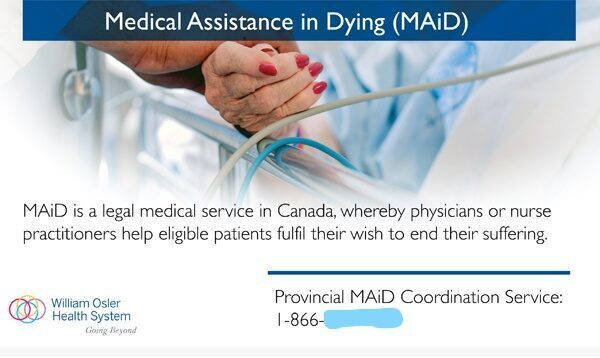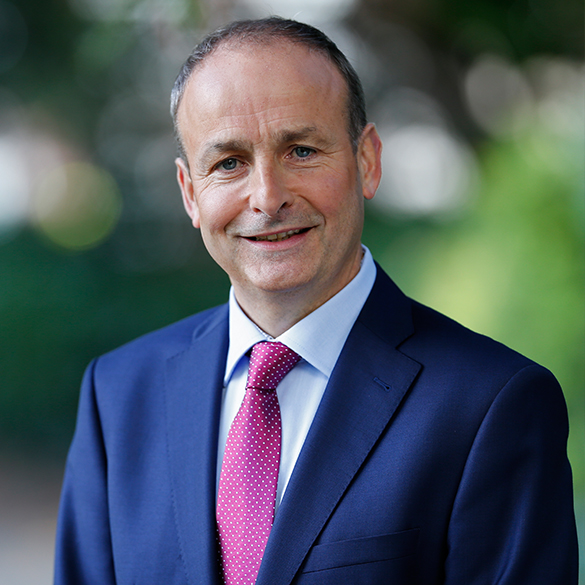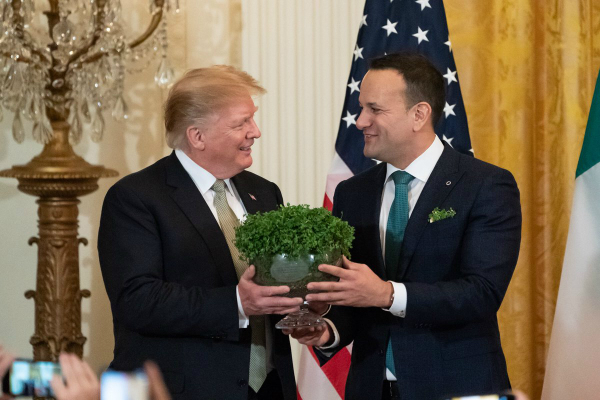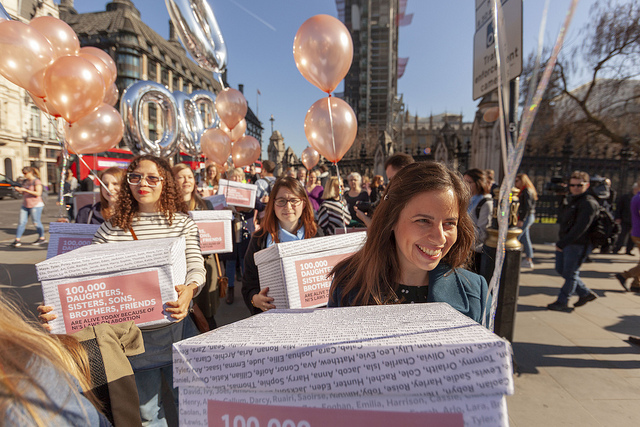
The Canadian government has just released the fourth interim report on euthanasia deaths since the practice was legalised in 1916 and it reveals a steady rise in numbers of people undergoing it.
For Canada as a whole (excluding Quebec, Northwest Territories, Yukon and Nunavut) the monthly number of cases of euthanasia increased by 60% from 163 per month in 2017, to an average of 261 per month in the period Jan-Oct 2018.
Euthanasia deaths as a percentage of all deaths varies by province with British Columbia (2.37% of all deaths) nearly three times more than Saskatchewan (0.84% of all deaths).
The canadian law MAID – so-called ‘medical assistance in dying’ – includes both euthanasia and assisted suicide. As of October 2018 there have only been six cases of assisted suicide under the Canadian law compared to 6743 cases of euthanasia.

The Archbishop of Armagh, Eamon Martin has said that the “witness and martyrdom of so many persecuted Christians around the world…reminds us of the importance of advocating for freedom of conscience and religion.” He was speaking at a Mass on Sunday in St Patrick’s Cathedral, Armagh, in which he remembered the bombings in Sri Lanka last week in which more than 250 people were killed, mostly while attending Mass.
The victims were also remembered in the Pro-Cathedral Dublin yesterday at a Mass celebrated by Archbishop Diarmuid Martin. The congregation included President Michael D Higgins, the Taoiseach’s Aide-de-Camp, Commandant Caroline Burke, and members of the Irish Sri Lankan community.
Archbishop Martin told the congregation of his shock at “the terrible violence that hit the Sri Lankan nation”.
“Naturally, as Catholic Christians we remember in a special way our own Christian brothers and sisters who were among the prime targets and victims of the violence. May God grant them eternal rest and peace,” he said.
Dr Lal Fernando, who is an assistant professor in the Irish School of Ecumenics, spoke of how his sister, who is a primary school teacher in Negombo, saw seven of her pupils killed in the attack, along with 18 of their family members.
When he spoke with his sister, he said she was “weeping inconsolably as she with her staff members, desperately attempted to identify the lifeless and disfigured bodies of her pupils”.

Fianna Fáil leader Micheál Martin has called for the suspension of the Petition of Concern mechanism in Northern Ireland as a way to break the current political deadlock on issues such as same-sex marriage or a standalone Irish language Act. The petition allows a majority of either Nationalist or the Unionist representatives to veto proposals on issues of serious importance, even if they are only a minority of the whole Assembly.
If that were not accepted, Mr Martin proposed that there be a referendum on same sex marriage as an alternative way to settle that issue.
Although a scandal regarding a renewable heat initiative and the extent to which blame fell on Arlene Foster caused the Government to fall, in talks early last year to resolve the political impasse, issues such as same sex marriage and Irish language prevented the parties reaching an agreement.
It is not clear however that resolving same-sex marriage would enable the devolved Government to be restored, or that it is even the most important issue dividing the parties.

Women’s preference for jobs that tend to pay less is the best explanation for the gender wage gap, according to new research conducted by the Economic and Social Research Institute (ESRI). Gender differences in job preferences contributed more to the wage gap than what they studied, the number of hours worked, or previous employment.
The researchers found that most of the difference in men’s and women’s earnings could still not be explained, however, suggesting that bias might still be a factor. But, they concluded that, across the EU as a whole, gender differences in job preferences accounted for 10% of the gap.
“We find that women place greater value than men on jobs that are close to home and offer good security, and these job preferences are associated with lower wages,” said the research paper, which has been published in the Oxford Bulletin of Economics and Statistics.
The study used information from 48,000 adult employees across all 28 European Union countries. It focused on full-time employees only and found a gender wage gap of 13% across the EU, meaning full-time male employees earned an average of 13% more than their female counterparts. This varied from country to country, with Ireland’s gender wage gap standing at 18%. Of this, 6.6% could be explained while 11.4% could not be accounted for.

Minister Regina Doherty has come under fire for suggesting that money is not the reason for the low take-up of paternity leave among fathers. Fianna Fáil’s social protection spokesman Willie O’Dea accused Ms Doherty of suggesting that men have no interest in looking after their newborns and said this is a “gross insult”.
“In my experience the vast majority of cases where people don’t take paternity leave it’s because they can’t afford it,” Mr O’Dea said.
Meanwhile, Richard Grogan, a specialist employment law solicitor criticised the minister for deciding to “play this card of men don’t want to be involved in the rearing of children” and said she should provide research to back this up. Mr Grogan said she should make paternity leave compulsory if this is what she believes.
Minister Doherty shot back at the criticism saying there’s still a perception “in much public discussion that caring is a ‘woman’s thing’ and that taking time off ‘real work’ is still a novelty for fathers”.
She argued that the remarks by Mr O’Dea and Mr Grogan “underline the resistance to any cultural change around who cares and who works and is regrettable. Ms Doherty added: “Similarly, over time, I hope initiatives like parental leave can change mindsets and, more importantly, actions – making it acceptable and possible for both parents to become actively involved in caring for their babies.”

Four days after the suicide bomb attacks in Sri Lanka that targeted Christian Churches and high-end hotels, the Taoiseach Leo Varadkar has made a statement on the atrocity.
After a front page article appeared in the Irish Catholic newspaper asking ‘Why the silence Leo?’, the Taoiseach posted a message on twitter that he had written that same day to the Sri Lankan Prime Minister.
In the tweet, he said: “Wrote to the Sri Lankan Prime Minister today to expresss our solidarity, our sympathy for the victims and to offer our support following the Easter Sunday attacks”.
He added: “Freedom of religion is a hallmark of any free society. Attacking religious ceremonies is deeply abhorrent.”

China is “at war with faith,” according to the U.S. Ambassador at Large for International Religious Freedom. Noting the country’s rising tides of discrimination against Muslims, Catholics, and Buddhists, Ambassador Sam Brownback said the United States has a duty to ensure that religious liberty is aggressively defended.
During his visit, Brownback criticized last year’s Vatican deal with China, which reportedly allows for the Chinese government to have a say in the appointment of the country’s bishops. “Since this provisional deal was announced last year, the Chinese government’s abuse of members of the Catholic community has continued. We see no signs that will change in the near future,” Brownback said while in Hong Kong.
He told Crux that his criticisms came in response to concerns raised by Tibetan Buddhists who feared that the deal could “set a precedent” for the state exercising control when it came to picking religious leaders.

The Women and Equalities Committee (WEC) report into abortion law in Northern Ireland is at odds with the submissions received and raises serious questions for devolution, campaign group Both Lives Matter said today.
A majority of the committee called for law change in Northern Ireland to allow abortion in cases of ‘fatal foetal abnormality’, even though an estimated 88% of submissions from the public in the North did not support change.
Co-Founder of the Northern Irish group Both Lives Matter, Dawn McAvoy, said the proper place for a debate on this is in the North, not in the committee rooms of Westminster. She said there is an attempt to “impose abortion law change” by Westminster, while “completely bypassing our elected representatives”.
She added: “On the face of it, the recommended changes appear to be limited, but there is no guarantee that any resulting legislation would not be extended to provide abortion access, far beyond these recommendations. It is important the public are aware that the proposals today are a small part of a wider campaign to radically alter abortion law across the UK to remove any protection for all the lives involved in a pregnancy”.

German lawmakers on Tuesday called for stronger protection of Christian minorities worldwide after coordinated attacks on churches and hotels in Sri Lanka on Easter Sunday killed more than 300 people.
Members of German Chancellor Angela Merkel’s conservative Christian Democratic Union (CDU), the liberal Free Democrats (FDP) and Greens all expressed their concern about what they saw as growing violence against Christians.
Germany’s commissioner for religious freedom, Markus Grübel (CDU), told Die Welt newspaper that the Sri Lankan attacks were part of what appeared to be a global trend. “Christians are the target of radical Muslims worldwide,” Grübel said, a phenomenon that he found to be “incomprehensible,” given “Christianity’s close relation to Islam.”
Former CDU parliamentary leader Volker Kauder echoed his colleague’s sentiment, denouncing “growing persecution of Christians in the entire Asian region” in an interview with Bild newspaper. For Kauder, the attacks in Sri Lanka did not represent an isolated case: “nationalist movements of Buddhists, Hindus and Muslims are becoming more and more militant here.”
The FDP’s deputy leader in the German parliament, Michael Theurer, told Die Welt that more than 100 million Christians lived in countries “where the basic human right of religious freedom is currently not respected.” In many places such as “China, North Korea, Pakistan or parts of Nigeria,” Christians comprise the largest persecuted minority, Theurer said.
Sven Giegold, a member for the Greens in the European Parliament, shared the view that Christians’ religious freedom is threatened worldwide. “Europe must emphatically stand up in the world for the right to freedom of religion,” Gievold said.

The Easter Sunday attacks in Sri Lanka are only the latest and deadliest in an uptick of violence against the Christian minorities in the country, who make up 7 percent of the populace. In 2018, Buddhist extremists burned down both Muslim-owned shops and Christian churches across the country, while the state police and civil authorities were criticised for not adopting stronger measures to protect the religious minorities targeted.
Pew Research lists Christians as the most attacked faith in the world, with significant levels of persecution in 144 countries, according to 2016 data.
The persecution varies widely. In countries like Egypt, Syria, and Iraq it is due to the effects of Islamic fundamentalism and sectarian violence in the region.
In China, the authoritarian atheist government is tightening its restrictions on the country’s Christians.
Indian Christians face an “extreme” level of persecution, up from “high” just five years ago, due to spikes in Hindu extremism targeting churches, as well as halfhearted government responses failing to protect these minorities
Even in the West, hostility to religion is on the rise. Journalists have reported a record 47 documented desecrations of church property in France for February 2019. In Germany, three-quarters of resettled Christian refugees claim to experience persecution, mostly from the Muslim refugees which surround them. The number of attacks on Catholic churches in the whole of Europe is already up 25 percent compared to the number of attacks during a similar period last year.